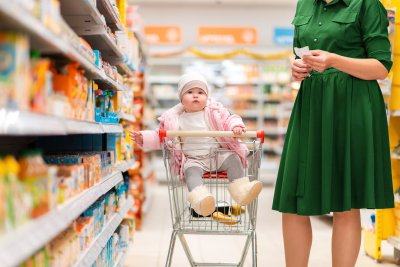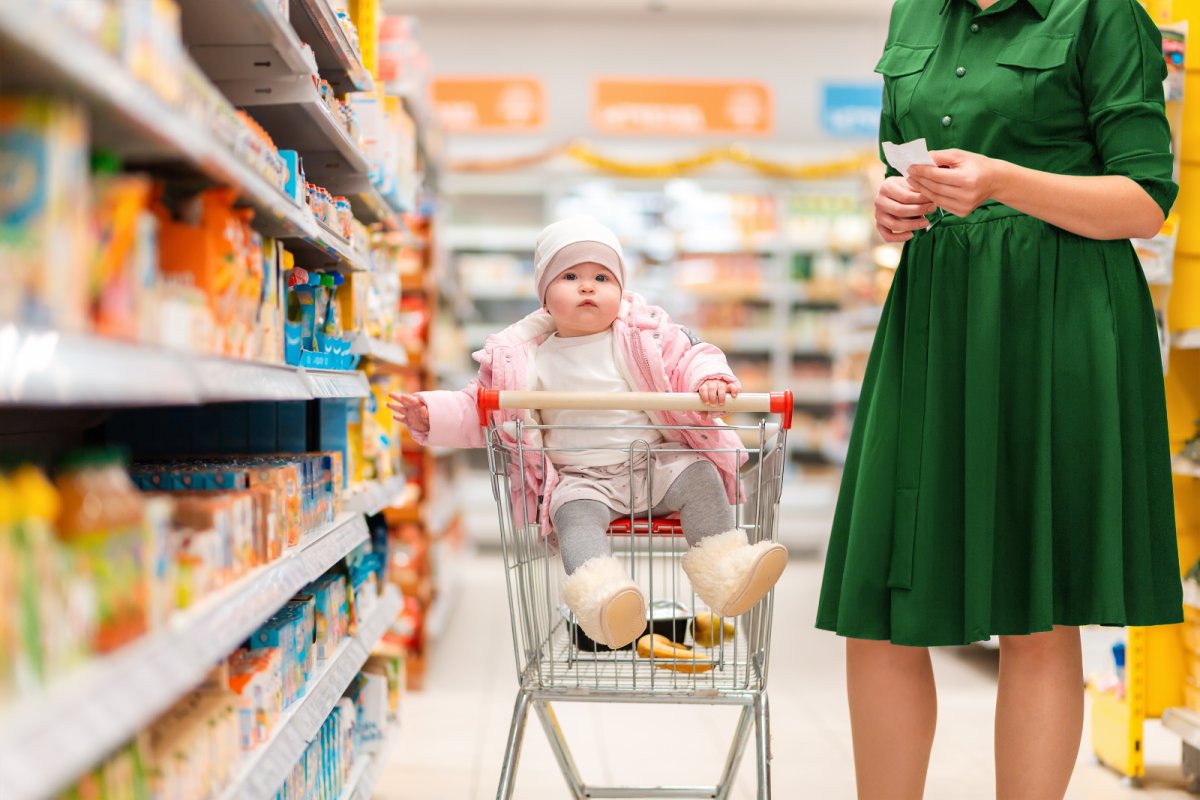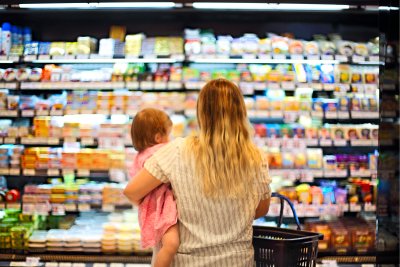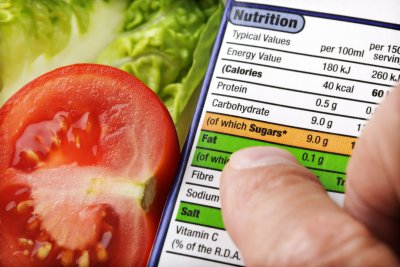 A mother and baby at the supermarket. Credit: STEKLO | shutterstock
A mother and baby at the supermarket. Credit: STEKLO | shutterstock

Not just pouches: Unhealthy baby and toddler food industry fully exposed
As BBC Panorama exposes the truth behind baby food pouches, groundbreaking new research from the University of Leeds including parent polling supported by Sustain, also throws a further spotlight on snacks, misleading marketing claims and the need for proper regulation of the baby food aisles. Children's Food Campaign is immediately calling on MPs and government to act.
The UK’s baby and toddler food market is awash with “low quality” products with poor nutrition masked by misleading names and on pack messaging, according to newly published wide-ranging research by University of Leeds scientists.
The new report "Commercial Baby Foods in Crisis" is based on analysis of the nutrition, price and sustainability of over 630 baby food products plus parental insight via focus groups and polling with over 1000 parents of children aged 0-3 years old.
With around 1.7m children between six and 36 months in the UK, a growing market in inappropriate and poor nutritional baby products could could be impacting national child growth and development. The research found that large numbers of commonly available and popular baby food products are high in sugary pureed fruit, often watery and low in energy, minerals and vitamins – therefore not providing young children with the nutrition they need.
- More than half of snack products surveyed contain added sugar, undermining guidance not to feed sugar to infants under 2 years
- 2 in 5 (41%) main meals were too sweet and had high sugar levels
- Many early weaning foods are being sold as suitable for four months+, against NHS and World Health Organisation guidance to introduce foods from six months of age
- 1 in 5 (21%) ready-to-eat fruit products, cereals and meals were too watery and had low energy density, according to WHO standards, not providing adequate nutrition
- 9 in 10 (89%) fruit products should carry a ‘high sugar’ warning label according to international recommendations
- Pouches with spouts make up over a third of the baby foods market (38%) and around half of them did not include a recommendation not to let children drink via the spout
- On-pack messaging often masked poor nutrition or supported the ‘health halo’ of making foods appear to be healthy or ideal choices.
The work was carried out by Dr Diane Threapleton, Ali Morpeth and Professor Janet Cade of the University of Leeds’ School of Food Science and Nutrition, supported by Sustain's member Which?.
The researchers are amongst several public health nutritionists and parents interviewed for a BBC Panorama programme "The Truth about Baby Pouches", airing from Monday 28 April. The increased use of baby pouches with spouts is causing concern about the levels of sugary consumption by young children and also drinking directly from the pouches increasing risk of tooth decay. The research revealed that around half of the pouches analysed in the research did not provide guidance around not consuming directly via the spout.
Dr Diane Threapleton, senior research fellow at the University of Leeds said:
“We found the baby food market is deluged with poor quality products where poor nutrition is often masked by misleading names and on-pack messaging. This is letting families down. Parents expect bought baby foods to be well-regulated and healthy for their young children.”
“Time-poor families should be able to trust the products on their local supermarket’s shelves are good for their babies.
“We want manufacturers and retailers to improve the way the formulate and market these products, making the health and nutrition of our youngest children their top priority.
“We also believe the government should be stepping in and regulating this large and lucrative market, so that anyone caring for young children can have confidence the products they can access are giving their children the best possible start in life.”
Ali Morpeth, co-author of the study and a registered public health nutritionist said:
“We spoke to more than 1000 parents in our research. Many were shocked to learn that there are no regulations for sugar in baby foods, and there was wide-spread support for front-of-pack labels to indicate high sugar content."
Sustain's Children's Food Campaign worked with the research team to co-commission UK-wide polling of 1000 parents of children aged 0-3. This survey was conducted online by Savanta, and found that:
- Over 9 in 10 parents (92%) of children aged 0-3 use commercial baby and toddler foods, with almost half (47%) using them "always" or "most of the time".
- 2 in 3 (64%) parents use savoury baby snacks (puffs, crackers) and over half (57%) use sweet baby snacks either daily or several times a week.
- 1 in 3 parents in low-income groups reported cost-of-living pressures had changed their shopping habits, including looking for cheaper brands. In the product survey, cheaper fruit pouches and snacks were likely to be more sugary, and baby pouches more watery.
- 1 in 5 parents still use fruit based purees and pouches with children age 2-3 years, when children should be eating proper foods.
- 7 in 10 parents would like to see front-of-pack warning labels for products containing high levels of sugar
- 2 in 3 parents agree that products should not be labelled as suitable for four month old babies.
Responding to the report and Panorama programme, Children's Food Campaign Manager Barbara Crowther says:
“All babies and children have a right to grow up healthy, but overwhelmingly the commercial baby and toddler food industry is misleading parents about the nutritional benefits of their products. Millions of parents regularly use these brands and want to trust them, so they’re shocked and angry to learn the truth - that they’re not nearly as healthy as they claim to be, and they’re not even being regulated properly.
This excellent but shocking new analysis from BBC Panorama and the University of Leeds should be a wake-up call to the government. It’s time to wean ourselves off relying on voluntary guidance for the baby food industry and bring in strict regulation, based on the excellent World Health Organisation standards for product composition and marketing of infant foods. Let’s put babies and toddlers at the forefront of our efforts to create the healthiest ever generation of children and stop sugarcoating these pouches and products.”
Sustain's Children's Food Campaign has immediately responded by launching a new campaign to get Members of Parliament to raise concerns with government health ministers, and support the call for more effective mandatory regulation of the commercial baby and toddler food industry.
Take action now
Tell your MP to stand up for healthy baby food.
Children's Food parent ambassador Mary Carlton says:
“It’s outrageous that these commercial baby products are so rammed with sugar! As parents we put our faith in the products that we buy and are very easily manipulated by positive images and health claims. Shopping with a small child is challenging, especially when you are sleep deprived and juggling multiple responsibilities. Government policy should see a lot more regulation of sugar levels in baby foods as well as improving the fibre and protein contents and whole foods”
Our parent manifesto Our Children, Our Future has called for honest and transparent labelling of products, especially for babies and infants. The new research shows common use of vague 'health halo' claims that mislead parents. Examples include:
- Stating ‘no added sugar’ when most of the calories are from sugar
- Claiming to be ‘nutritionally balanced’ which is meaningless
- Claiming ‘immune support’ when the food contains some vitamin C
- Claiming to be the ‘ideal’ way to feed your little one, undermining simple home-prepared foods
At present, baby and toddler foods sold for children under three years old, including pouches and snacks, are not included in advertising or promotional restrictions on products high in fat, salt and sugar (HFSS). The composition of these products comes under older regulations from 2003.
Nutritionists, researchers and children's health organisations are urging the UK government to adopt the WHO Nutrient Profiling and Promotion Model for baby and infant foods, including banning all nutrition, health or marketing claims on baby food packaging in order to eliminate the “health-halo” effect and help families make the best choices for their children based on accurate information.
Ali Morpeth says:
“Current baby food regulations are seriously outdated, not including any sugar limits for instance. Voluntary standards are notoriously ineffective in driving industry change for public health, so we believe the government needs to step in and set mandatory regulations to improve the market for babies.
“We want manufacturers and retailers to improve the way they formulate and market these products, making the health and nutrition of our youngest children their top priority.”
“We also believe the government should be stepping in with regulations, so that anyone caring for young children can have confidence the products they can access are giving their children the best possible start in life.”
Read the detailed recommendations in the full report Commercial Baby Foods in Crisis
Further comments from Children's Food Campaign partners and members
Dr Vicky Sibson, Director, First Steps Nutrition Trust said:
“Parents naturally want what is best for their babies and young children, especially when it comes to what they’re fed. We know that there is a high level of trust in the baby food industry and that shop-bought baby foods are widely used because parents believe they’re strictly regulated and healthy choices. But unfortunately, this trust is totally misplaced. As a result of pervasive misleading marketing, parents are unwittingly buying products that are simply not good enough nutritionally. Stronger, mandatory baby food regulations are long overdue. The Government must act now to dramatically improve the commercial baby food offer and to ensure that parents can informed choices on what they’re feeding their youngest children”.
Read First Steps Nutrition Trust briefing: NOT the best start: Why the government must act now to better regulate the baby food industry
Children's Food Ambassador Lauren Morley, parent of a six year old, says:
“It’s shocking that the food industry has been able to get away with this. When you become a new mum, you’re exhausted, overwhelmed and you trust the products sold for babies. Why wouldn’t you? But behind the bright packaging and health claims, many baby foods are packed with sugar- sometimes as much as sweets and there’s no proper regulation to stop it. The industry knows parents are vulnerable and busy, and they exploit that trust. We urgently need change: clear rules on sugar limits, better nutrition standards, and honest labelling. Parents deserve the truth. Our children deserve better.”
Children's Food Ambassador & parent of a toddler Jaynaide Powis says:
“As parents, we want the best for our children. As a country, I believe we want the same - they are our future after all. So why is it that the cheapest and most convenient food options are often the unhealthiest? It is clear that the health and wellbeing of our children has not been a priority. Instead, commercial companies have put their profits first, and successive governments has allowed them to do this. We urgently need mandatory regulation so that the easiest and cheapest options are the healthiest options. This way, parents are supported and our children can thrive like they deserve. It's time to put our babies first.”
Take action now
Tell your MP to stand up for healthy baby food.
Children's Food Campaign: Campaigning for policy changes so that all children can easily eat sustainable and healthy food.
Sustain
The Green House
244-254 Cambridge Heath Road
London E2 9DA
020 3559 6777
sustain@sustainweb.org
Sustain advocates food and agriculture policies and practices that enhance the health and welfare of people and animals, improve the working and living environment, promote equity and enrich society and culture.
© Sustain 2026
Registered charity (no. 1018643)
Data privacy & cookies
Icons by Icons8







